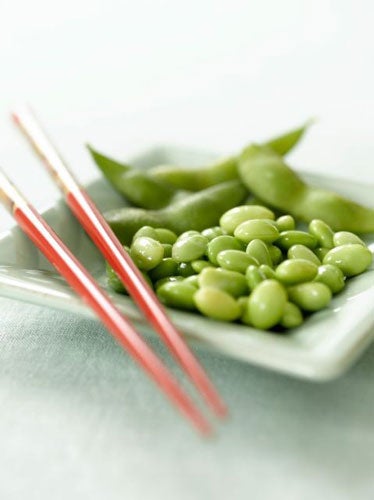Asian super-bean to gain roots in Britain
Protein-rich edamame beans to be grown commercially in the UK

Your support helps us to tell the story
From reproductive rights to climate change to Big Tech, The Independent is on the ground when the story is developing. Whether it's investigating the financials of Elon Musk's pro-Trump PAC or producing our latest documentary, 'The A Word', which shines a light on the American women fighting for reproductive rights, we know how important it is to parse out the facts from the messaging.
At such a critical moment in US history, we need reporters on the ground. Your donation allows us to keep sending journalists to speak to both sides of the story.
The Independent is trusted by Americans across the entire political spectrum. And unlike many other quality news outlets, we choose not to lock Americans out of our reporting and analysis with paywalls. We believe quality journalism should be available to everyone, paid for by those who can afford it.
Your support makes all the difference.They have been touted as a super-food and credited with everything from staving off heart disease and cancer to maintaining Victoria Beckham's super-slim figure. Now the Asian edamame bean is being grown commercially on British soil for the first time, allowing shoppers to satisfy oriental tastes while still "buying British".
Health-conscious shoppers find it difficult to get hold of the beans, which, despite their exotic name, are actually immature, green soy beans, picked before they are completely ripe. They are a favourite choice in restaurants such as Itsu and Yo!Sushi, and are also sold in Japanese supermarkets. First popularised by the Japanese restaurant Nobu, a favourite haunt of celebrities such as Jennifer Lopez and Kate Moss, they are usually eaten as an appetiser or a side-dish, served sprinkled with salt.
Because they are imported frozen and availability is limited, cafés and restaurants charge over the odds for edamame beans; takeaway customers at Itsu can expect to pay £2.50 for a 120g pot. But now the beans will be grown in Kent and sold in Asda, fans should be able to buy them at bargain rates.
Edamame beans are said to be the only vegetable that contains all nine essential amino acids, making them a complete protein source in the same way as meat or eggs. Recent studies indicate that people who eat soy products regularly have a reduced risk of several types of cancer.
"If you eat them in the course of a generally healthy diet based on starchy foods, with lots of fruits and vegetables, they can make a valuable contribution to your nutrient intake," said Elisabeth Weichselbaum from the British Nutrition Foundation.
The beans are also a good source of fibre, folate, iron and zinc, and their low calorie-content means that they are widely recommended for dieters.
"Foods high in fibre can help you lose weight," Dr Weichselbaum added. "But there is no single 'miracle' food that helps you drop pounds without changing your general eating and lifestyle habits."
There are several Asian-origin pretenders to the status of "super-food" now sprouting in British soil and being sold in UK supermarkets. The Chinese cabbage pak choi was first grown commercially in this country two years ago, in response to soaring consumer demand.
Home-grown pak choi is now sold in supermarkets such as Waitrose, alongside more traditional British vegetables, and is used in stir-fries, salads, braised or in soups.
Join our commenting forum
Join thought-provoking conversations, follow other Independent readers and see their replies
Comments